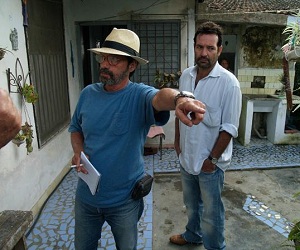 First there was Enrique Pineda Barnet and now Juan Carlos Tabío, who died January 18, at the age of 77. It is no exaggeration to say that he was the director who best captured, almost always in a humorous key, the essence of what is Cuban, from a boundlessly imaginative point of view.
First there was Enrique Pineda Barnet and now Juan Carlos Tabío, who died January 18, at the age of 77. It is no exaggeration to say that he was the director who best captured, almost always in a humorous key, the essence of what is Cuban, from a boundlessly imaginative point of view.
Arriving at the Cuban Institute of Cinematographic Industry and Art (Icaic) in 1961 as a simple apprentice, Tabío made documentaries on various subjects before making his feature-length debut with Se permuta (1984), a film that inspired me, that very year, to write in these pages: “For Tabío it was important for viewers to not only have fun and laugh, but also reflect on what they were seeing, to feel part of the story and its possible solutions. If his film is an engaging dialogue from beginning to end, it is because “the Cuban”, the everyday, the popular and unshaven, is there…”
Arriving at the Cuban Institute of Cinematographic Industry and Art (Icaic) in 1961 as a simple apprentice, Tabío made documentaries on various subjects before making his feature-length debut with Se permuta (1984), a film that inspired me, that very year, to write in these pages: “For Tabío it was important for viewers to be not only have fun and laugh, but also reflect on what they were seeing, to feel part of the story and its possible solutions. If his film is an engaging dialogue from beginning to end, it is because “the Cuban”, the everyday, the popular and unshaven, is there…”
This was a constant in his filmmaking, marked by experimentation, a willingness to disregard the conventional and, at the same time, very effectively employ critical social comedy, extracting from reality what fiction could make transcendent.
Se permuta, Plaff, Lista de espera, El cuerno de la abundancia, were films that brought millions of spectators to our theaters, and it is enough to close our eyes for a moment to remember those days when going to the movies was an event, and Juan Carlos Tabío became the magician of “serious laughter,” adored by an audience that applauded throughout the screening.
Serious laughter, because in his stories there was nothing mechanically included, and every provocation, with humor as the narrative basis of forceful arguments, came from a social and human context he knew well, an indispensable requirement to make the critical function of art an effective instrument, as long as one has talent and sensitivity, and Tabío had plenty.
When Tomás Gutiérrez Alea got sick in the middle of filming Fresa y Chocolate (1993), he found in Tabío that indispensable other self to become co-director. It was then that a fusion emerged of characters not given to repeating themselves in a drama that did not lack a touch of humor. Alea was more focused on the intellectual aspect of the conflict, Tabío drawing on his popular roots, and with the emotional power of the script by Senel Paz, Gutiérrez Alea himself, would make the film an international event. An audacious combination that both directors would repeat in Guantanamera (1995).
Aunque estés lejos, El elefante y la bicicleta, La inolvidable Dolly Back, (the short film about impersonation that happily disconcerted viewers) and others, are also among the memorable works of Tabío, who was a screenwriter and professor as well, widely acclaimed both nationally and internationally.
The 2014 National Prize for Film was awarded to this intelligent artist, with vast wisdom and culture, with whom it was always a pleasure to discuss art, or life itself, and see him move from an amicable tone to the most open emotionality, those outbursts that made him as authentic as his films.
The world of cinema, and especially Cubans, will miss him, and not only because of his transcendence as a filmmaker.
(Taken from Granma)